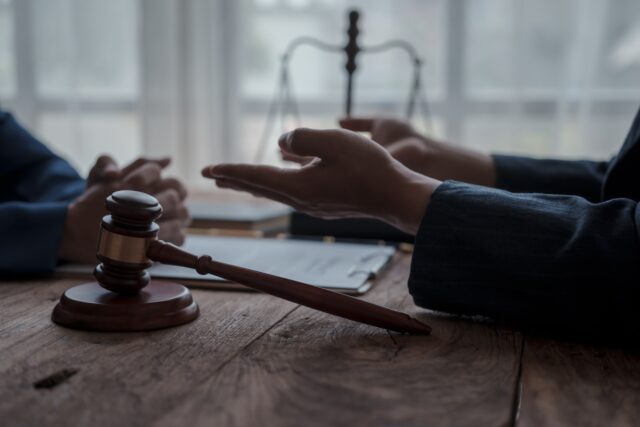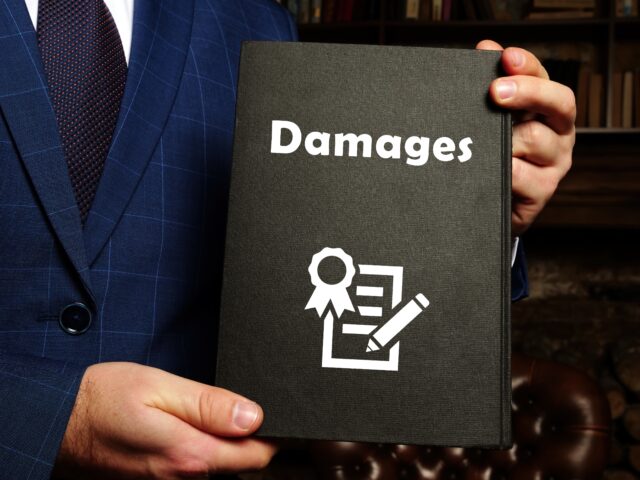In a wrongful death suit, surviving victims have a right to pursue a claim to recover compensation for financial losses and non-economic hardships the family has endured with the passing of their loved one.
If you have suffered a tragic loss due to someone’s negligence or wrongdoing, consult with a Rogers wrongful death lawyer immediately. You’ll want to discuss your legal rights, including the right to recover financial compensation.
Rogers Wrongful Death Guide
- What Is Wrongful Death?
- What Is Wrongful Death in Terms of Claim Types?
- Who Can File a Wrongful Death Lawsuit?
- What Is the Statute of Limitations for Wrongful Death?
- How Long Does a Wrongful Death Claim Take to Settle?
- What Is the Average Settlement in a Wrongful Death Lawsuit?
- What Are Wrongful Death Damages?
- What If I Can’t Afford a Wrongful Death Lawyer?
- Call for Your Free Consultation With A Wrongful Death Attorney Today
What Is Wrongful Death?
Wrongful death ensues when a person or entity, such as a trucking company, fails to fulfill their legal act of duty, resulting in a person’s death. Your attorney is responsible for proving the following to secure compensation:
- That the at-fault party behaved negligently or committed an intentional act of harm
- That their actions were the direct cause
- That there were damages resulting from their death
After your wrongful death lawyer proves these elements of negligence, they can begin negotiations with the liable parties.
What Is Wrongful Death in Terms of Claim Types?
Wrongful deaths result from various negligent and intentional acts caused by other people. Common types of wrongful death claims include:
Traffic Collisions
Motor vehicle accidents are the leading cause of wrongful deaths in the U.S. Factors such as impaired, distracted, and aggressive driving are common causes of these collisions. Traffic accidents include:
- Auto accidents
- Commercial truck accidents
- Motorcycle collisions
- Rideshare collisions (Uber and Lyft)
- Bus accidents
- Micro Mobility accidents (e-scooter, e-bike, electric pedal-assisted bicycle, electric skateboard, hoverboard)
- Train collisions
- Boat collisions
- Aviation accidents
Sometimes, traffic collisions, resulting in wrongful death, do not involve victims who are driving other motor vehicles—for example, pedestrian, bicycle, scooter, and skateboard accidents.
Work Accidents
Workplace accidents cause wrongful death, especially in higher-risk industries such as construction and general laborers (electricians, roofers, welders), fishing and hunting workers, loggers, miners, manufacturers, and offshore oil rig workers.
Nursing Home Neglect and Abuse
Nursing home abuse and neglect are prevalent in nursing facilities across the U.S. The AARP reports the common and dangerous overuse of psychotropic drugs in nursing facilities, resulting in wrongful death.
Medical Malpractice
Medical malpractice occurs when a medical professional neglects to provide proper medical treatment or take appropriate action. It also commonly involves administering inadequate treatment, resulting in wrongful death. Medical errors are the third-leading cause of death in the U.S.
Animal Attacks and Accidents
Animal attacks resulting in wrongful death are valid claims. Dog bites are prevalent in the U.S., with statistics suggesting approximately 4.5 million dog bites annually. Homeowners’ insurers paid $1.12 billion in dog bite and other dog-related injury liability claims last year.
Intentional Acts
When someone causes your loved one’s death intentionally, you may have the right to sue for wrongful death compensation. Intentional or criminal acts causing wrongful death include robbery, assault, battery, and homicide.
Premises Liability
Premises liability outlines a property owner’s responsibility to maintain a safe environment for people visiting. People injured or who die due to an accident on someone else’s property may be entitled to compensation. Common premise liability accidents and circumstances that result in wrongful death include:
- Slips and falls
- Drowning in swimming pools or other bodies of water on a person’s property
- Fires
- Amusement park accidents
- Ceiling collapses
- Defective sidewalks
- Elevator and escalator accidents
- Falling objects
- Stair collapses
- Poor lighting
- Obstructed pathways
Environmental hazards, such as toxic exposure to harmful substances, including mold and asbestos, also qualify as premise liability in a wrongful death claim.
Product Liability
Defective products are other significant contributors to wrongful death and are filed under product liability cases. Common examples of defective products are defective medical devices, failure to warn consumers of potential risks, manufacturing and design defects, and breach of warranty (product fails to meet the terms expressed in warranty).
Accidental Poisoning and Overdoses
Accidental poisoning and overdoses are commonly associated with prescription drugs, such as opioids. In instances where the overdose was a medication error, you may have the legal right to file a wrongful death claim—for example, improper administration of an IV drug in the hospital.
Negligent parties may include the prescribing doctor, treating physician, manufacturer, medication distributor, or pharmacist if their error (filling the wrong prescription) caused the wrongful death.
Who Can File a Wrongful Death Lawsuit?

In most states, immediate family members have the right to file a wrongful death suit. While laws vary by state, a general order of priority typically determines this sequence of eligible wrongful death beneficiaries.
- Surviving Spouse: If a decedent (deceased) was married, surviving spouses are generally first in line as beneficiaries.
- Domestic Partner: Many states equate domestic partnerships to surviving spouses. Ask your lawyer to clarify your state allowance.
- Surviving Children: The biological children of the decedent have the right to pursue wrongful death if there is no surviving spouse. Depending on the state, stepchildren, adopted, and foster children may also have a right to claim if they were financially dependent on the deceased.
- Surviving Parents: If the deceased was a minor or unmarried with no children, the surviving parents have a right to seek compensation in a wrongful death suit.
- Secondary Beneficiaries: Secondary beneficiaries are extended relatives such as siblings, aunts, uncles, grandparents, and distant relatives. People not related to the decedent but financially depend on them are also secondary beneficiaries.
- Personal Representative of the Decedent’s Estate: A personal representative, or executor, is a person the deceased named in their will to be in charge of their estate. If there is a personal representative, they can file wrongful death actions.
- Presumed Spouse: Presumed spouses believe they were married to the decedent, not knowing their marriage was invalid. For example, a putative spouse might be someone who married a person who was already married or who was underage at the time of the nuptials. If they were dependent on the deceased and not married to another person, they may have a right to file a claim.
- Parents of a Deceased Fetus: Some states acknowledge the death of a fetus as a basis for a wrongful death suit. Others allow parents to bring a suit only if the child was born and then died due to someone else’s negligence. Ask your lawyer to clarify this circumstance for you.
Multiple parties wanting to file wrongful death suits should have a local attorney explain the conditions outlined by their state. Some states will only allow one wrongful death action per victim to be brought. Others will consolidate multiple claims into one case. Still, some will allow for multiple wrongful death claims, provided individual law firms bring them.
What Is the Statute of Limitations for Wrongful Death?
The statute of limitations for wrongful death suits varies by case and state. Most states impose a two-to-three-year limitation. However, other states have varying statutes. Your wrongful death attorney will clarify that for you.
How Long Does a Wrongful Death Claim Take to Settle?
A wrongful death claim can be settled in a few months or take several years. Many factors influence this timeline, such as the type of claim, the complexity of the case, the severity of the decedent’s suffering, the length of the investigation, and negotiations with insurers.
What Is the Average Settlement in a Wrongful Death Lawsuit?
A wrongful death suit’s average settlement varies by circumstances, jurisdiction, and state. Many factors influence the size of a wrongful death settlement, including:
- The decedent’s age
- The decedent’s health before the accident
- The decedent’s education and formal training
- The decedent’s lost earning ability (including expected promotions and benefits)
- The age of survivors and their circumstances
- How much the decedent suffered
- Degree of fault
- Insurance coverage
- Strength of the case
- The defendant’s ability to pay
Your attorney will work with medical, vocational, economic, psychological, and accident reconstructionist experts to ensure maximum compensation when settling your wrongful death suit. Inform your lawyer of all wrongful death-related damages.
What Are Wrongful Death Damages?

Wrongful death damages are losses a spouse or family member can seek compensation for in a wrongful death claim. These damages are meant to recover financial losses incurred and compensate for intangible losses survivors experience after losing a loved one, like mental anguish.
There are three primary categories of wrongful death damages: economic, non-economic, and punitive. However, the latter is rarely sought.
Economic Damages
Economic, or special damages, are the financial losses incurred due to the decedent’s wrongful death. They are monetary damages with a paper trail, making them easily calculable when demanding compensation in a wrongful death case.
Medical Costs
Any medical costs relating to the accident resulting in the wrongful death of your loved one are economic damages your attorney will calculate in your claim. Medical expenses commonly associated with wrongful death suits include:
- Emergency services (ambulance, ER visit, surgeries)
- Hospitalization
- Doctor and specialist services
- Prescription medication costs
- Home healthcare services
- Nursing facility expenses
- Hospice costs
Provide your wrongful death attorney with copies of all medical bills, statements, invoices, notices of collections, and receipts for out-of-pocket medical-related expenses. They will ensure adequate calculation and organization for your case.
Lost Income
Lost income is an economic damage awarded to the claimant in a wrongful death suit relating to the decedent’s employment income and benefits. Recoverable income losses include:
- Lost income, salary, commissions, and bonuses
- Lost benefits, such as medical insurance, retirement, pension
- Lost Social Security disability
- Lost earning capacity (future income, including promotions), assessed on the decedent’s career trajectory
The decedent’s age, occupation, education, marital status, and number of financial dependents are factored in when determining the value of lost income.
Property Damages
A claimant in a wrongful death suit can also recover property damages caused by the accident. These types of damages include:
- Vehicle damage, such as body, frame, safety features (airbags), mechanic parts, and electrical systems
- Bicycle and ski racks
- Car safety seats
- Smartphones, headphones, laptops, GPS systems, portable electronics
- Bicycles, skateboards, scooters, hoverboards
- Safety equipment like helmets
- Clothing, glasses, sunglasses, designer bags, luggage
Property damages also entail any damage caused to the decedent’s home (inside or out), mailboxes, fences, outdoor ornamental decorum, damaged gardens and landscaping, sprinkler systems, and destruction to commercial or residential buildings belonging to the deceased.
Household Services
If the severity of the victim’s accident prohibited them from performing daily tasks and required hired assistance before their death, those services may be recovered in your claim. For example:
- Childcare assistance with children dependent on decedent’s care
- Senior assistance with elderly parents dependent on decedent’s care
- House cleaning services
- House maintenance services like yard care
- Grocery shopping or delivery services
- Personal chef and meal delivery services
Provide your wrongful death attorney with copies of all household service invoices or receipts documenting them and a statement from a medical professional or medical record demonstrating their need for them.
Final Arrangement Costs
Final arrangement costs are egregious, with the average funeral cost growing to $7,848 (funeral viewing and burial) and $6,971 (funeral with cremation) in recent years.
Surviving victims of wrongful death should not be responsible for absorbing these costs, especially when the tragedy wasn’t their fault.
This is a time for grieving and processing. Consult a wrongful death lawyer to discuss recovering these damages in a wrongful death claim. They can assume the burden of proving negligence and secure the compensation you deserve.
Loss of Inheritance
A loss of inheritance is the loss of the value of assets the victim reasonably would have added to the estate and left to the claimant at the time of natural death in a wrongful death suit. If the victim died before collecting an inheritance they were set to receive, it may be recoverable economic damage in a wrongful death claim.
Non-Economic Damages
Non-economic or general compensatory damages are non-monetary losses the decedent’s family suffers after a wrongful death. Loss of consortium (companionship, love, affection, marital relations, protection) is frequently considered for surviving spouses. Other non-economic wrongful death damages are:
- Pain and suffering experienced by the decedent before their death
- Your pain and suffering
- Emotional anguish and distress
- Loss of appetite
- Loss of ability to sleep (insomnia, discomfort, tossing and turning, nightmares)
- Depression
- Anxiety
- Post-traumatic stress disorder (PTSD)
- Decreased quality of life
- Loss of parental care (training and guidance)
The cap on non-economic damages varies by state. Some states set maximum dollar amounts, while others limit non-economic damages to a multiple of economic damages. Still, others have fluctuating caps based on the nature of injury. Wrongful death is the most severe injury sustainable, leading to sizeable payouts.
Punitive Damages
Most states do not award punitive damages in wrongful death actions. States that don’t explicitly allow or disallow them have courts that may find them permissible in extreme circumstances, rendering punishing a defendant for their despicable actions.
What If I Can’t Afford a Wrongful Death Lawyer?
Most wrongful death attorneys require no upfront fees or out-of-pocket expenses for the entire duration of your case. They work within contingency arrangements and only collect a pre-disclosed percentage of the final settlement if they obtain one.
Call for Your Free Consultation With A Wrongful Death Attorney Today
This practice makes it affordable for anyone to seek justice and substantial compensation in a wrongful death suit. Consult with a Rogers personal injury attorney to immediately discuss your case and eligibility for compensation.

